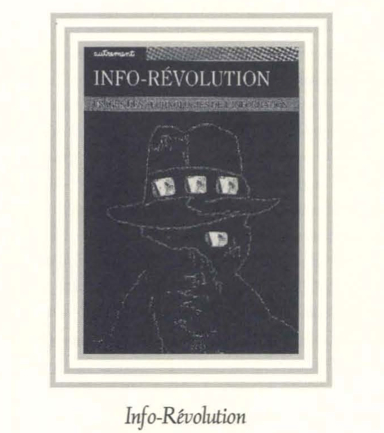The electronic revolution which is ravaging the industrial landscape has created an excellent breeding ground for new religious movements. Ranging from the academic postmodern philosophy to popular new age fantasies, the contemporary mind seems to be haunted by a technology craze. In Western Europe its progress is accompanied by an anxiety over the Japanese peril: the politicians of the failed super powers are desperately trying to regain a substantial role in the universal cable network by creating their own super- national integration. We don’t need the pamphleteers and prophets to get acquainted with the new realities: the encyclopedic and rationalistic introduction to the applications of information technology, written by Dominique Carré and edited for Autrement, will do.
Info-revolution contains a series of articles, interviews and data bases (like lists of key-words) which makes it a useful guide for those who want to know the basic structure of the info-galaxy. It doesn't restrict itself to the description of new technologies and their applications but, rather, gives an insight into all aspects of the social complex, from the economics of research to education by satellite and the European technology programs. For those living outside the francophone realm but want to keep in touch with the effects of the electronic revolution on the French language, a better glossary is hardly imaginable.
High tech doesn’t respect geographical borders. To write about computerization is to write about a world-revolution. Although a new world system is being formed, nations remain political facts and regional languages like French social realities. Info revolution underlines these observations. Written for a French public, it suffers undeniably from a slight French bias. The bibliography doesn’t contain any reference to English or American literature. It focuses mainly on France and its European context. Given the overall importance of the trilateral configuration, it is a pity that so little attention is paid to Japan and the USA in this excellent handbook.
Mediamatic Magazine vol 5#3 1 Jan 1990
Info-Révolution
Usages des Technologies de l'infoermation
Deminique Carré (ed), Autrement no.113, Paris 1990, ISSN 0751 0144, French text, pp. 348, FF149
